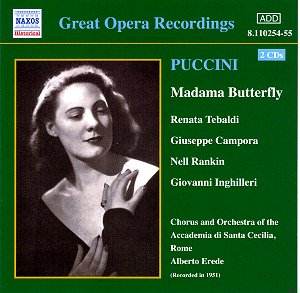Mark Obert-Thorn has
transferred the British LP pressings
of this Butterfly (LXT2638-40)
in near-exemplary fashion. There are
two main exceptions: the drop-out almost
exactly one minute into the opera and
the acoustic ‘jolt’ between tracks 5
and 6 on disc two. This product stands
as eloquent testimony to Tebaldi’s Butterfly:
not the most youthful Cio-Cio-San, perhaps,
but a moving reading possessed of many
moments of beauty.
Renata Tebaldi is indeed
the star of this Butterfly. At
the time of recording, she had yet to
sing the role on stage, but one could
hardly guess it, such is her involvement.
She owns the whole part, and in doing
so the big numbers become an intrinsic
part of the ongoing theatre. Her voice
is strong, yet able to suggest some
of Butterfly’s vulnerability. ‘Un bel
dì vedremo’ is light-toned and
incredibly touching. This is also due
in no small part to Erede’s accompanying
at this point: the orchestra sounds
so fragile it portrays true Oriental
delicacy. The lower reaches of Tebaldi’s
voice are also very effective (try the
section beginning, ‘Che tua madre dovrà’,
CD 2 track 3; her ensuing cries of ‘Morta’
are remarkably heart-felt). She can
float a note beautifully (try the end
of CD 2, track 6, when Butterfly and
Suzuki sing, ‘petali d’ogni fior!’,
for example).
Suzuki is taken by
US-born mezzo Nell Rankin, who joined
Zurich Opera in 1949, debuting at the
Met in 1951. Her darker voice contrasts
well with Tebaldi’s, enabling the final
sections of the opera to be truly effective.
Her singing of ‘Povera Butterfly’ (Act
2, part 2) is wonderfully rich, in tone
as well as in meaning.
Erede’s feeling for
Puccinian flow surfaces again for ‘Addio,
fiorito asil!’. Giuseppe Campora, a
New York Met regular, is the eloquent
Pinkerton. His voice is always focused
throughout his traversal of the role.
Campora can also act through his voice
(the ‘sobs’ in ‘Addio, fiorito asil’
are part of the interpretation, not
false).
Swiss bass Fernando
Corena is an authoritative Bonze. Recorded
towards the end of his career, Giovanni
Inghilleri’s Sharpless is warm and generous.
The splitting of the
two discs of the Naxos product is curious,
as it cuts after Sharpless’s ‘s’ei no
dovesse ritornar piú mai’, and
one is left hanging in the air, scrabbling
for the second disc to get Butterfly’s
reply.
It is Alberto Erede
who appears as the ‘other’ star of this
Butterfly. Try his pacing of
the Butterfly/Pinkerton scene in Act
1, in the house (CD1, track 7), a gripping
experience that flows from first to
last with an easy inevitability. The
opening to the second part of Act 2
sounds as an orchestral cry of anguish,
prefiguring the immensely moving close
of the work. Erede enables the work
to emerge as a coherent, emotion-shattering
whole.
Following their usual
format, Naxos has appended a series
of arias. Puccini provides the link
(Manon Lescaut, this time: a
very tender ‘In quelle trine morbide’),
through a darkly shaded ‘Tacea la notte’
(Verdi’s Trovatore) to two excerpts
from Gounod’s Faust, sung in
Italian. Tebaldi sings them well, but
‘Il était un roi de Thulé’
does rather sound like Puccini with
a French musical accent, and perhaps
the Jewel Song could have sparkled more.
But it is for Madama Butterfly
that you will buy this set, and you
will not be disappointed.
Notes, by the always
reliable and always readable Malcolm
Walker, are models of their kind.
Colin Clarke
The
dropout on CD 1, Track 1 and the bad
edit between Tracks 5 and 6 of CD 2
are on the original LP master tape,
and unfortunately could not be ameliorated.
Mark Obert-Thorn

